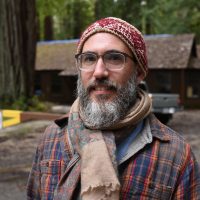I went to my first men’s group by chance. I didn’t have a clue what I was getting into, having never been in one, nor heard of one. When I arrived at the group, a few rules were stated by the moderator: 1. Always speak in the first person, “I” form; speaking from your own experience. 2. Try to look your fellow men in the eyes as you speak to the group. 3. Don’t speak about anything you heard or witnessed or to anyone once you leave the circle; confidentiality is key. In the particular group that I sat in, we passed around a sacred truth stick. The idea was that when one of us held the stick they held the power to speak the truth, and only those who held the stick should speak, the rest of us should only listen. One gesture that was permitted was to put one’s hand to one’s ear in a gesture symbolizing that we couldn’t hear the speaker. And then something happened, something magical that I wouldn’t have guessed. As each man spoke, some men cried, and in turn, those who listened, became softened and their eyes watered. The men began to see each other’s vulnerability as a strength, and they supported one another with an open hearted willingness to support each other’s vulnerability.
What can also emerge in men’s groups is a concerted effort to tackle bias in terms of race, class and sex. Within the context of a safe container men can let down their armour and begin to share to more authentically, and within this sphere of trust, men can admit the degree to which they enjoy privilege at the expense of others. For example, this weekend in NYC, as social distancing protocols were being followed in some areas of town more so than in others, the NYPD responded differently. In the West Village, cops wearing masks and gloves handed out masks to people in the park, while just two miles away in the Lower East Side, cops were recorded beating young black men for not properly social distancing. There must be a way to discuss these obnoxious disparities among men other than on social media where many times people seem to be angrier and more on their guard than they might be in more intimate settings.
Besides the disparities of race, there are equally gross disparities between men and women and it is clear that it is the men that need to step up, acknowledge their privilege and work together to dismantle it. When we level the playing field, we all rise to experience more abundance. As men unravel the roots of their trauma, both in groups and individually, they can sense more deeply how their actions reverberate in the public and political sphere. Just as there is always a spiritual element to every situation, there is always a political one. We exist entwined in each other, for better and for worse, as spiritual, physical and political beings. Our lives mean something on all these levels as we take up space and speak our truth to ourselves and our communities.
Men’s groups can foster informal, deeply healing settings for men to build trust in communicating in healthy and trusted platforms. Every little bit counts. Every time we open up, a little more of our true selves is revealed to us, and a little more happiness finds its way to our hearts and minds. A man who is on the path to healing their trauma, is less entrenched in their ego, and less driven to seek false senses of power. The healing of trauma occurs almost imperceptibly, as slowly as flower blooms in spring. In the dead of winter, you have a hard time imagining the full beauty of spring, but as the tendrils thaw, and the air warms, nature does what she does best, bursts with life. We are much the same. As our hearts warm, and as we get the nutrients we need, we blossom forth. Our souls need watering, and nothing nourishes us more than trust, being witnessed authentically and being acknowledged for our shared humanity. Men’s groups are forming all over the country, look one up in your area, or start one up yourself with the men in your life. Sometimes it takes just one of us to light the spark, and share in the sacred fire of solidarity.










Read 0 comments and reply